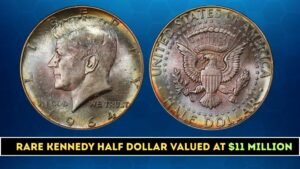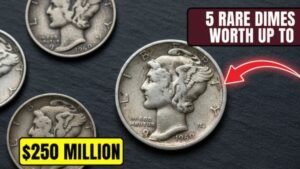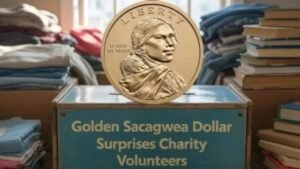Imagine rummaging through a dusty jar of loose change, pulling out what looks like a worthless arcade token—only to learn it’s a rare Sacagawea Dollar worth $1.2 million. This wild tale isn’t from a movie; it’s a real numismatic miracle that has hobbyists everywhere double-checking their pockets.
Why does it matter? Because rare coins like this prove everyday finds can turn into life-changing treasures. Stick around as we uncover the history, the hype, and tips to spot your own Sacagawea Dollar jackpot.
What is the Sacagawea Dollar?
The Sacagawea Dollar hit U.S. pockets in 2000, honoring the Shoshone guide who aided Lewis and Clark’s epic journey. It’s a golden-hued coin meant to revive dollar use, but it fizzled in circulation. Still, its striking design—Sacagawea cradling her baby—makes it a favorite among rare coin collectors.
The Cheerios Promotion: Origin of a Rare Gem
In early 2000, General Mills slipped special Sacagawea Dollars into 5,500 Cheerios boxes as a promo. These weren’t ordinary; they boasted an enhanced eagle reverse with bolder tail feathers. Most got spent or tossed, birthing one of numismatics’ hottest rarities.
From Token to Treasure: The Shocking Discovery
Picture this: A family heirloom jar yields a shiny disc used for years as a game token. Ignored amid arcade junk, it was the 2000-P Cheerios Sacagawea Dollar. A sharp-eyed expert spotted the telltale feathers, authenticating it for auction. Bids exploded, landing at $1.2 million—proof that fortune favors the forgetful.
Why This Sacagawea Dollar Matters in Today’s Market
Rare coins like this thrive in a booming collector scene, where scarcity drives sky-high values. With under 5,500 survivors, this piece symbolizes minting magic and American history. It’s relevant now as inflation pushes folks toward tangible assets—turning hobby into smart investing.
Hunt for Hidden Value: How to Engage with Rare Coins
You don’t need a vault to join the fun. Start by scanning your change for that enhanced eagle. Join numismatic clubs or apps like CoinSnap for quick IDs. Selling? Use trusted auction houses to cash in safely. It’s thrilling—your next Sacagawea Dollar could fund a dream vacation!
Notable Facts and Auction Highlights
This coin’s saga packs punchy stats. Here’s a quick compare of regular vs. Cheerios varieties:
| Feature | Regular Sacagawea Dollar | Cheerios Sacagawea Dollar |
|---|---|---|
| Reverse Design | Standard eagle | Enhanced tail feathers |
| Mint Mark | P or D | P (Philadelphia) |
| Estimated Total | Billions minted | Fewer than 5,500 |
| Typical Value | Face value ($1) | $10,000+; up to $1.2M |
And check these auction highs for similar rare Sacagawea Dollars:
| Date | Grade | Sale Price | Auction House |
|---|---|---|---|
| May 2025 | MS-68 | $1.2M | Heritage |
| 2021 | MS-67 | $6,600 | Stack’s Bowers |
| 2008 | MS-68 | $29,900 | Heritage |
Expert Tips for Aspiring Numismatists
Pros say: Never clean coins—it tanks value. Get PCGS or NGC grading for proof. Hunt estate sales for overlooked gems. And remember, patience pays; this token sat for 25 years before glory.
Frequently Asked Questions
What’s the rarest Sacagawea Dollar feature?
The Cheerios’ bold eagle feathers—check yours under magnification!
Are all 2000 Sacagawea Dollars valuable?
Nope, only promo variants. Regulars are just lucky bucks.
How do I sell a rare coin?
Authenticate first, then hit eBay or pros like Heritage for max bids.
Conclusion
This $1.2 million mix-up reminds us: History hides in plain sight. Whether you’re a numismatic newbie or seasoned hunter, grab that magnifier and dive in—your rare coin story awaits. Share your finds below, or explore more on valuable Sacagawea Dollars. Who’s checking their Cheerios stash today?




